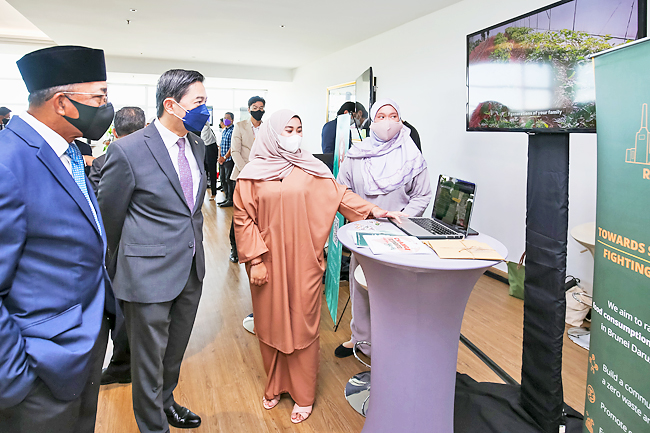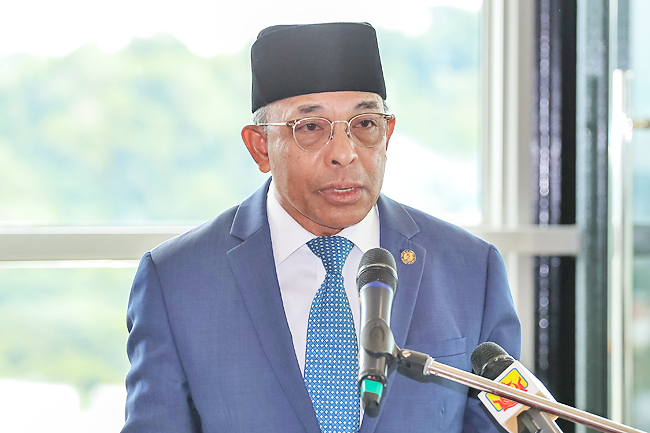Brunei Darussalam is not exempted from the effects of climate change. Mean temperatures have been increasing in the Sultanate at a rate of 0.25 degrees Celsius per decade, and may reach four degrees Celsius by the end of the century. Mean monthly rainfall has been increasing at a rate of 100 millimeters (mm) per decade and is forecasted to increase to a mean of 500mm by 2050.
This was said by Minister of Development and Co-Chair of Brunei Darussalam National Council on Climate Change (BNCCC) Dato Seri Setia Ir Awang Haji Suhaimi bin Haji Gafar during the signing of memorandum of understanding (Mou) between Bank Islam Brunei Darussalam (BIBD) with the BNCCC to cooperate on climate action solutions.
The minister added, “We have experienced an increase in the numbers of floods, forest fires, major landslides and strong winds, damaging the buildings and environment that we call home. In 2019 alone, we had the highest daily rainfall of 275mm and fires that destroyed more than 160 hectares of rainforests.
“These are some of the impacts of climate change and therefore adaptation is crucial. Our efforts today are still largely incremental, reactive and small scale, mostly focussing only on current impacts and near term risks.
“Existing adaptation options can reduce climate risks if they are sufficiently funded and implemented more quickly.
“Feasible solutions already exist but more support must reach vulnerable communities. Therefore, it is important that we increase adaptation measures and future proof our country and our communities.”
 Minister at the Prime Minister’s Office and Minister of Finance and Economy II Dato Seri Setia Dr Awang Haji Mohd Amin Liew bin Abdullah and Minister of Development Dato Seri Setia Ir Awang Haji Suhaimi bin Haji Gafar being briefed during the exhibition. PHOTOS: BAHYIAH BAKIR
Minister at the Prime Minister’s Office and Minister of Finance and Economy II Dato Seri Setia Dr Awang Haji Mohd Amin Liew bin Abdullah and Minister of Development Dato Seri Setia Ir Awang Haji Suhaimi bin Haji Gafar being briefed during the exhibition. PHOTOS: BAHYIAH BAKIR
Dato Seri Setia Ir Awang Haji Suhaimi also highlighted the establishment of the ASEAN Centre for Climate Change in Brunei as shared by His Majesty Sultan Haji Hassanal Bolkiah Mu’izzaddin Waddaulah ibni Al-Marhum Sultan Haji Omar ‘Ali Saifuddien Sa’adul Khairi Waddien, Sultan and Yang Di-Pertuan of Brunei Darussalam at the recent United States – ASEAN Summit and on outcome of Brunei’s ASEAN Chairmanship last year.
“With the centre, Brunei Darussalam will be the hub of knowledge and research on all matters pertaining to climate change in the region.
“Although the country’s contribution to global greenhouse gas is low, at 0.025 per cent of total global greenhouse gas emission annually, our commitment stands strong as part of our national agenda to combat climate change, which was reaffirmed by our commitment at the Paris Agreement.
“We are moving towards net zero by 2050 which will be driven mainly through transition and forest preservation. It will not be an easy task for us but it is necessary. We believe that we will be able to make a big difference with our small actions and unlock significant opportunities for green growth and job creations,” the minister added.
Dato Seri Setia Ir Awang Haji Suhaimi also stressed that climate change is a key issue that impacts everyday lives and is the greatest threat to global health in 21st Century. These changes have become more apparent in the mid to late 20th Century as we tracked and monitored temperature changes in the atmosphere.
 Dato Seri Setia Ir Awang Haji Suhaimi delivers his remarks
Dato Seri Setia Ir Awang Haji Suhaimi delivers his remarks
“2018, 2019 and 2020 hold the distinction of being the warmest years on record. Although 2021 was not the hottest year because of La Niña events, it still ranks as one of the even warmest years on record as captured by the World Meteorological Organization. Climate change threatens people with food and water scarcity, increased flooding, extreme heat, more diseases and economic losses.
“The recently published sixth Intergovernmental Panel on Climate Change (IPCC) Report paints a troubling picture: Climate change is already impacting every corner of the world and much more severe impacts are in store if we fail to halve greenhouse gas emissions this decade and immediately scale up adaptation.”
Even if the world decarbonised, he said, “Greenhouse gases in the atmosphere and current emissions trends will make some very significant climate impacts unavoidable through 2040.
“The IPCC estimates that in the next decade alone, climate change will drive 30 million to 130 million more people into extreme poverty. Global warming will jeopardise food security as well as increase the incidence of heat related mortality, heart diseases and mental health challenges”.
The minister added, “The report finds that every 10th of a degree of additional warming will escalate threats for people, species and ecosystem. Even limiting global warming to 1.5 degrees Celsius – a global target in the Paris Agreement- is not safe for all.
“It is crucial to raise awareness on the effects of climate change and to embed climate change competences as well as integrating climate informed strategic planning and decision making”.













